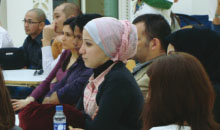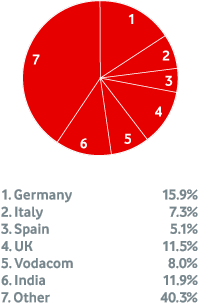People
Vodafone employed an average of around 85,000 people worldwide during the 2010 financial year. We rely on our people to maintain and build on our success and to deliver excellent service to our customers. We aim to attract, develop and retain the best people and to realise their full potential. We maintain high levels of employee engagement, investing in employees’ development and offering attractive, performance-based incentives and career progression.
Culture, communications and engagement

Employees
85,000

Nationalities in top senior management roles
26
Employees by location

- The Vodafone Way aligns all Vodafone employees to a common set of values and behaviours.
- Aiming to be an admired, innovative and customer-focused company operating with speed, simplicity and trust.
- Maintained high performance benchmark for employee engagement.
During the 2010 financial year we launched a change programme called “The Vodafone Way”. The Vodafone Way is about being an admired company in the eyes of our customers, shareholders and employees by operating with speed, simplicity and trust. The programme has defined a consistent set of values and behaviours for all Vodafone employees. Many of our senior leaders have been through a workshop to embed The Vodafone Way behaviours and these workshops will be extended to all senior leaders during the 2011 financial year. The performance and potential of our employees are reviewed against the standards of The Vodafone Way.
The Vodafone Way is very much about increasing customer focus. For one day each month senior leaders in every operating country and the Group spend time with customers and customer-facing staff, such as in retail stores or contact centres. Insights from these customer days are used to simplify customer-facing processes and improve customer experiences.
In November 2009 we carried out our fifth annual global people survey. The survey measures employees’ level of engagement (a combination of pride, loyalty and motivation). 89% of employees surveyed responded which is four percentage points more than last year.
We achieved an overall employee engagement score of 76% which means that we have maintained the high performance benchmark for engagement for the second year in a row. The high performance benchmark is an external measure of best in class organisations that achieve strong financial performance alongside high levels of employee engagement. This achievement demonstrates that people continue to feel proud to work for Vodafone and are committed and willing to give their best.
Regular, consistent and open communication is fundamental to ensuring we maintain high levels of employee engagement. Our people have access to information about our business through a global intranet with local translations and content where appropriate. The Chief Executive communicates directly with all of our employees via regular email and video updates particularly focusing on business performance, strategy and The Vodafone Way. This is reinforced with local CEO communications in all our markets. Relevant performance and change issues are also discussed with employee representatives from operating companies within the European Union, who meet annually with members of the Executive Committee in the Vodafone European Employee Consultative Council.
Organisation effectiveness and change
- Continued focus on efficient and effective organisation structures .
- Headcount reduction in several markets including the UK and Ghana.
- Successful integration of Arcor into Vodafone Germany.
We continued to optimise the shape and size of our organisation during the 2010 financial year. The majority of operating companies reduced the number of layers from the top to the bottom of their organisation and increased management spans of control, resulting in flatter structures with wider management accountability. Several of our markets made significant organisation changes in the year:
- Vodafone UK simplified its organisation structure, primarily in back office functions, resulting in 490 redundancies. In the 2011 financial year the UK will be recruiting for 170 new customer-facing roles and appointing 50 graduates into their graduate programme;
- 233 redundancies were made across central commercial functions. The majority of these were from the reshaping of the internet services function which included the closure of Wayfinder, Vodafone’s location based services organisation in Sweden;
- the formation of the joint venture, Vodafone Hutchison Australia, in June 2009 led to 340 redundancies from Vodafone Australia;
- Vodafone Ghana continued its change programme reducing employee numbers by 1,331 and recruiting more than 350 Ghanaians into new roles in the business;
- Vodafone Turkey reviewed its organisation structure to streamline processes and reduce duplication. This resulted in over 300 redundancies. Turkey has reinvested in hiring similar numbers of new talent into key roles and building a graduate recruitment programme;
- in December 2009 the legal merger of Arcor and Vodafone Germany was finalised and the two organisations have been successfully integrated following the creation of a single executive committee in March 2009.
The above organisation changes clearly had significant implications for the employees in these markets. Changes were communicated clearly and transparently. We offered a range of support to help affected employees find new jobs, for example outplacement services, insights into how to set-up their own business and training on interview and resume writing skills. Vodafone aims to treat all employees fairly, ensuring healthy employee relations through open communications and employee consultation.
Talent and resourcing
- Regular reviews of peoples’ performance and potential.
- Graduate recruitment programmes in almost all operating countries.
- Continued focus on increasing diversity and inclusion:
- 14% of senior leaders, two Executive Committee members and three operating company CEOs are female; and
- 26 nationalities are represented in senior leadership roles.
During the 2010 financial year we increased our focus on driving high performance and building a strong base of talented leaders and employees. All managers are encouraged to hold regular performance discussions with their direct reports. Annual performance dialogues are mandatory to enable each employee to receive a performance and potential rating which is the basis for development planning and reward decisions. Quarterly departmental and operating company talent reviews have been introduced, alongside annual development boards. For most senior leadership roles, the Executive Committee review succession and key appointments each month.
We want to attract the best and brightest graduates to work in all of our operating companies. A globally consistent graduate recruitment programme has been introduced with a target of 230 top graduate hires across the Group during the 2010 calendar year. We have also partnered with seven leading MBA schools to hire top MBA graduates to join us and progress to key management and leadership roles.
We aim to create a working culture that is inclusive to all and believe that having a diverse workforce helps to meet the different needs of our customers across the globe. We do not condone unfair treatment of any kind and offer equal opportunities for all aspects of employment and advancement regardless of race, nationality, sex, age, marital status, sexual orientation, disability or religious or political belief. This also applies to agency workers, self employed persons and contract workers who work for Vodafone. In the latest people survey 87% of employees agreed that people in Vodafone are treated fairly, regardless of their gender, background, age or belief.
The main focus of our diversity strategy has been on gender with actions taken to provide inclusive working policies and to increase inclusive behaviour amongst managers. Compared to the 2009 financial year there has been a slight increase in the percentage of women in senior roles, up from 13% to 14%. There will be continued efforts to increase the proportion of women in senior leadership roles during the 2010 financial year.
More recently we have extended our diversity strategy to focus on diversity of nationality, industry background and technical experience. 26 nationalities are represented in the senior leadership of the Group.
Learning and capability development
- Global programmes continue to develop high potential employees.
We are committed to helping people reach their full potential through ongoing training and development. In our most recent people survey 71% of employees rated their opportunities to develop their skills and knowledge as good or very good.
Inspire, our global leadership development programme, is in its second year. The programme focuses on identifying and developing potential future leaders from within the Group. The programme builds commercial capability and leadership skills through an 18 month fast-track approach. 67 managers from 19 countries participated in the programme during the 2009 calendar year and 51 have started on the 2010 calendar year course. Of the managers who have completed the programme, 40% have been promoted to a more senior role.
Performance, reward and recognition
- Extension of reward differentiation based on individual performance.
- Replacement of UK defined benefits pension scheme with enhanced defined contribution scheme.
We reward employees based on their performance, potential and contribution to the success of the business and we aim to provide competitive and fair rates of pay and benefits in every country where we operate. Global short- and long-term incentive plans are offered to leadership and management levels and paid according to individual and company performance.
In response to global economic conditions a pay freeze policy was introduced to the senior leadership team in the 2010 financial year. Most operating companies did however award bonuses through global or local plans, with greater emphasis on rewarding strong business and individual performance.
In January 2010 we confirmed the closure of our UK defined benefit pension scheme for future accruals on 31 March 2010. All UK based employees were invited to join a new, enhanced defined contribution pension scheme, which we believe is now highly competitive in the local market as well as more sustainable longer-term.
Health, safety and wellbeing
- Significant and increased effort to address the frequency and likelihood of fatal accidents in high risk countries.
The health, safety and wellbeing of our customers, employees and others who could be affected by our activities are of paramount importance to us. Expansion in emerging markets and the application of the most rigorous and demanding tracking methodologies have this year highlighted an unacceptable level of fatal accidents. It is deeply regrettable that 27 fatalities occurred related to our operations in the 2010 financial year. 24 of these were third party contractors and three were Vodafone employees. Over 80% of these incidents occurred in India, Ghana and Turkey – markets with a legacy of poor safety practice and infrastructure, and a high rate of road accidents.
Loss of life as a consequence of us doing business in any country is unacceptable to us and tackling the causes of these fatalities is a top priority. Urgent action was taken to improve safety governance and awareness in these countries which has resulted in a significant reduction in fatal incidents in the second half of the 2010 financial year. In the countries where the majority of the incidents occurred we have introduced a fatality prevention plan and linked this to the performance objectives of each CEO. The plan includes two key initiatives: adopting Det Norse Veritas’ International Safety Ranking System (‘ISRS’) and implementing a set of absolute rules as mandatory requirements to drive safe behaviour. Further details can be found at www.vodafone.com/responsibility and in the 2010 sustainability report.
Employment policies and employee relations
- We aim to be recognised as an employer of choice.
- We strive to maintain high standards and good employee relations.
Our employment policies are developed to reflect local legal, cultural and employment requirements. We aim to be recognised as an employer of choice and therefore seek to maintain high standards and good employee relations wherever we operate.
Our business principles set out our ethical standards and we have recently developed a code of conduct that defines what employees need to do to live up to our business principles. New and existing employees will receive communication and training on the code of conduct during the 2011 financial year.
Key performance indicators
| KPI | 2010 | 2009 | 2008 |
|---|---|---|---|
| Total number of employees(1) | 84,990 | 79,097 | 72,375 |
| Employee turnover rates (%) | 13.0 | 13.0 | 15.2 |
| Number of women in the top senior management roles | 33 out of 228 | 29 out of 221 | 26 out of 211 |
| Number of nationalities in the top senior management roles | 26 | 23 | 20 |
- Note:
- (1)
- Represents the average number of employees during the financial year.


 © Copyright Vodafone 2010
© Copyright Vodafone 2010